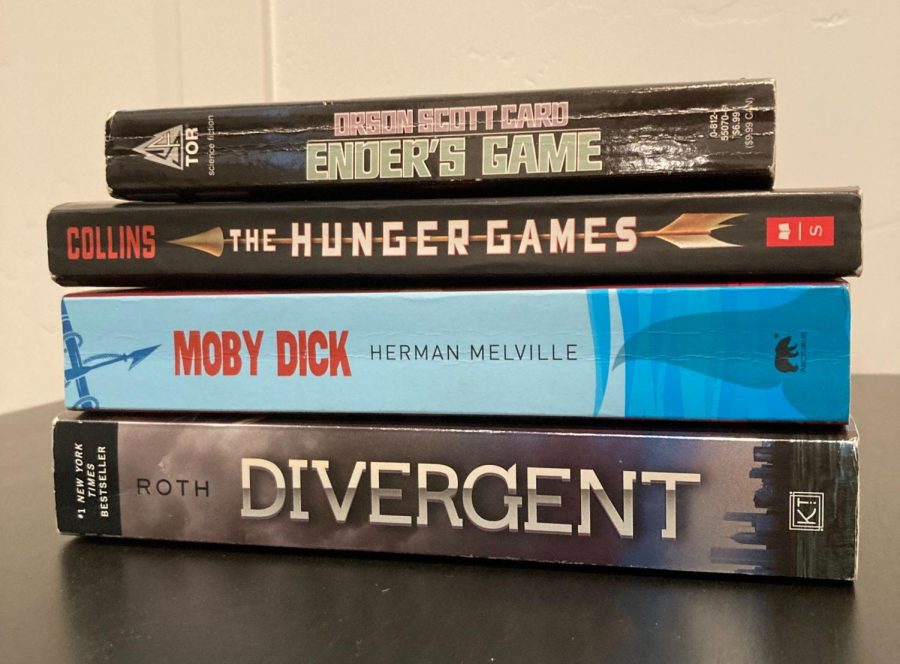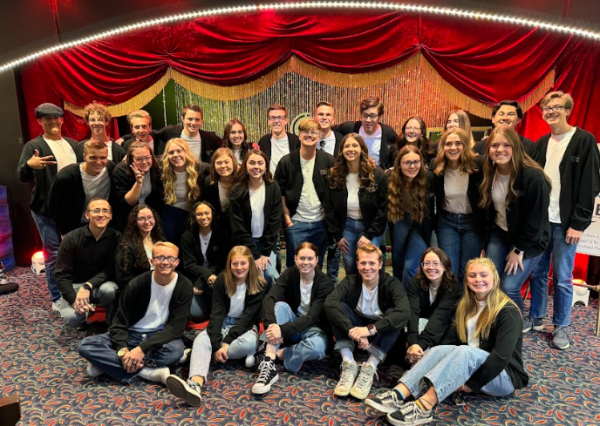Should Books Be Challenged?
From bottom to top, books Divergent, Moby Dick, The Hunger Games and Ender’s Game are displayed.
Should books be challenged in schools?
Nothing is better than going to the library and picking up a good book. It is amazing how simple words on a page can transport you anywhere you’d like to go. You can visit a magical castle, trek through a fantasy realm, or fly in a spaceship. The magic of reading is universal, but is it being dismissed?
All across the country, books are being challenged for having content that is said to be harmful or unsuitable for certain age groups. The most challenged books tend to be young adult novels or books with diverse content. Many classics of the 20th century have also been challenged as well, such as The Catcher in the Rye and Lord of the Flies. According to the American Library Association, these books were the most challenged and banned books of 2020:
George by Alex Gino
Stamped: Racism, Antiracism, and You by Ibram X. Kendi and Jason Reynolds
All American Boys by Jason Reynolds and Brendan Kiely
Speak by Laurie Halse Anderson
The Absolutely True Diary of a Part-Time Indian by Sherman Alexie
Something Happened in Our Town: A Child’s Story About Racial Injustice by Marianne Celano, Marietta Collins, and Ann Hazzard, illustrated by Jennifer Zivoin
To Kill a Mockingbird by Harper Lee
Of Mice and Men by John Steinbeck
The Bluest Eye by Toni Morrison
The Hate U Give by Angie Thomas
The reasons for these books being challenged include explicit content, drug use, anti-police views, and homosexuality. A study was conducted about who is issuing the challenges, and the results showed that 43% of all challenges came from the school’s patrons, followed by the 18% from parents.
Even children’s books are not safe from these challenges. The acclaimed Harry Potter series has had to endure challenges and bans since its release, due to the claim that they promote mischief and occult forces. The Captain Underpants books, a popular children’s series, has been challenged for its potty humor for years. Even Roald Dahl’s novels have been challenged for being too scary for children, so books like James and the Giant Peach and The Witches are off many library shelves.
In situations like this, there is always a debate that circulates around: is challenging these books harmful or beneficial to children? Many argue that removing books from a library is alienating to some children. Professor Durand, of Arizona State University, is firmly against banning books that delve into issues such as homosexuality and race. In regards to the harm to young readers, she said, “[Banning books] implies that reading and talking about these issues is somehow shameful and denies youth the opportunity to find relief in knowing they are not the only ones facing these issues.”
However, it is also important to realize that censorship is not an inherently bad thing. A lot of the time, the censorship of media and literature help keep children safe from harmful stereotypes or themes that are too intense for their age. There is a delicate line that teachers and administrators dance every day to try and keep the literature selection as safe as possible. The line is not a straight one either: it curves and moves with the changing climate that we live in. It is important to remember that our society’s cultural, religious, and moral values change drastically over time, and that these values will always be reflected in literature.
Stories are a safe haven for many of us. I often will bury my stress under a mountain of stories. I do believe that today’s literature is an impactful and important way to discuss the issues our society is going through, but I do think that there is also a time and place for censorship. We cannot live in a world where everything is censored, but we also cannot allow a world where everybody has access to everything. It is the balance between the two extremes that we must find. Literature is important to many, and we must find a way to allow creative voices to be heard and their target audiences reached without losing sight of the morals we uphold.





